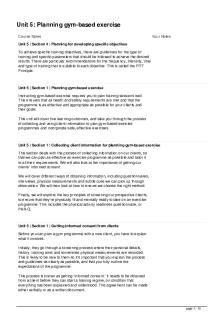Week 3 - Personality based on Sport and Exercise Science PDF

| Title | Week 3 - Personality based on Sport and Exercise Science |
|---|---|
| Course | Developmental Psychology |
| Institution | Buckinghamshire New University |
| Pages | 3 |
| File Size | 125.3 KB |
| File Type | |
| Total Downloads | 87 |
| Total Views | 130 |
Summary
Download Week 3 - Personality based on Sport and Exercise Science PDF
Description
Personality and Performance Athletes who played in team sport vs non athletes: - Less abstract reasoning - More extraversion - More dependency - Less ego strength Athletes who played individual sports vs non athletes: - Higher levels of objectivity - More dependency - Less anxiety - Less abstract Thinking Female athlete compared to female non athletes: - Assertive - Emotionally Stable - Aggressive - Independent - More achievement orientated Iceberg Profile “An ideal profile of mood state for elite performers” -
Characterised by low scores of negative moods - on the x axis (Tension, Depression, Anger, Fatigue and Confusion)
Critique of the iceberg profile - Profile differentiates between successful and less successful athletes - Only accounts for less than 1% of performance variation - Cannot justify team selection based on iceberg profile Personality and Exercise Self-Concept - An individual's belief about themselves including the person's attributes and who/what the self is - Exercise has been shown to have a positive relationship with self-concept
Cognitive Strategies & Athletic Success “Type A personality (Strong sense of urgency and high hostility) and Type B personality (More tolerant and relaxed)” -
Quantitative and Qualitative cognitive strategy have shown to differentiate between more and less successful athletes Overachieving athletes scored higher in coachability, concentration, coping with adversity and total cognitive strategy Mental preparation and planning are critical components of an athletes success Individual Differences in Personality
1) Perfectionism “The wish for everything to be without fault ” Perfectionist - A person who wants everything to be without fault and demands the highest possible standards Perfection - The state of being complete and correct in every way Perfect - Without fault 3 Types of perfectionism: Self - Oriented - Sets high personal standards and stringently self-evaluates relative to those standards Socially Prescribed - Perceives significant others hold high standards for the person and bases approval on meeting those standards Other - Oriented - Holds others to extremely high standard Implications for perfectionism: Maladaptive Perfectionism: -
Focus on high standards accompanied by concern over mistakes an evaluation by others Associate with excessive exercise, poor performance and athlete burnout
Adaptive Perfectionism: -
Focus on high standards but not excessively worrying about making mistakes or about others evaluation of performance Associated with better learning and performance and more adaptive goal patterns
2) Mental Toughness “An ability to cope with or handle pressure, stress, and adversity”
-
Mental toughness is having the natural or developed psychological edge that enables you to: Generally, cope better than your opponents with the many demands (competition,
-
training, lifestyle) that sport places on a performer. Specifically, be more consistent and better than your opponents in remaining determined, focused, confident, and in control under pressure. Mental Toughness Attributes:
-
Having an unshakable self belief in your ability to achieve your competition goals Bouncing back from performance set-backs as a result of increased determination to succeed Having an unshakable self-belief that you possess unique qualities and abilities that make you better than your opponents Thriving on the pressure of competition Accepting that competition anxiety is inevitable and knowing that you can cope with it Not being adversely affected by others’ good and bad performances Remaining fully-focused in the face of personal life distractions Switching a sport focus on and off as required Remaining fully-focused on the task at hand in the face of competition-specific distractions Pushing back the boundaries of physical and emotional pain, while still maintaining technique and effort under distress (in training and competition) Regaining psychological control following unexpected, uncontrollable events (competition-specific)
3) Coping -
Coping is defined as behavioural or cognitive efforts to manage situation that are appraised as stressful Coping involves both emotion - focused coping (managing emotional responses) and problem - focused coping (changing problematic aspects of stressful events) Coping self-efficacy - Represents a person's perceived ability to cope effectively with life challenges...
Similar Free PDFs

Exercise # 3 EARTH AND SCIENCE
- 6 Pages

WEEK 3 Forensic Science
- 14 Pages

Inquiry-Based Science Education
- 3 Pages

Planning gym-based exercise
- 10 Pages

Personality and Crime, Lecture 3
- 2 Pages

Week 2 Personality Disorders
- 11 Pages

Exercise 15 life science
- 4 Pages

Tutorial 3 - notes on week 3
- 3 Pages

Sport Confidence - 3
- 5 Pages

Projects based on Cancrusher
- 2 Pages
Popular Institutions
- Tinajero National High School - Annex
- Politeknik Caltex Riau
- Yokohama City University
- SGT University
- University of Al-Qadisiyah
- Divine Word College of Vigan
- Techniek College Rotterdam
- Universidade de Santiago
- Universiti Teknologi MARA Cawangan Johor Kampus Pasir Gudang
- Poltekkes Kemenkes Yogyakarta
- Baguio City National High School
- Colegio san marcos
- preparatoria uno
- Centro de Bachillerato Tecnológico Industrial y de Servicios No. 107
- Dalian Maritime University
- Quang Trung Secondary School
- Colegio Tecnológico en Informática
- Corporación Regional de Educación Superior
- Grupo CEDVA
- Dar Al Uloom University
- Centro de Estudios Preuniversitarios de la Universidad Nacional de Ingeniería
- 上智大学
- Aakash International School, Nuna Majara
- San Felipe Neri Catholic School
- Kang Chiao International School - New Taipei City
- Misamis Occidental National High School
- Institución Educativa Escuela Normal Juan Ladrilleros
- Kolehiyo ng Pantukan
- Batanes State College
- Instituto Continental
- Sekolah Menengah Kejuruan Kesehatan Kaltara (Tarakan)
- Colegio de La Inmaculada Concepcion - Cebu





